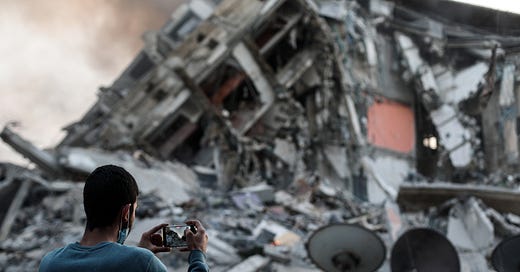However bad you think it is in Gaza, it's worse
We can't limit ourselves to just "one side" of the story.
Issue #442 OpEd December 18, 2023
Of course, I don’t support Hamas. Of course, it is a terrorist organization and of course, their October 7 attack on Israel was horrific.
That’s stating the obvious.
What is not so obvious, because the American pro-Israel narrative is reflexively so ‘pro’ as to ignore or excuse any of their wrongdoings, is that the Israeli response to that inexcusable attack is more inexcusable than the attack itself. And that’s not even factoring in the apartheid conditions under which Palestinians have been forced to live for decades that have made it significantly easier for Palestinian radicalization to take place.
I have more or less avoided saying anything about the Hamas/Israeli war ever since it started on October 7 because it is such a sensitive topic. I just didn’t want to open myself up to all the white-hot emotionalism that boils up around this issue whenever anyone speaks up - especially when speaking up involves criticism of Israel.
A recent essay published in The New York Times makes it virtually impossible to stay quiet about what the Palestinians are being forced to endure - and about how the Biden administration needs to significantly step up the pressure against the Israeli government. I remain a staunch supporter of President Biden, and I continue to believe without question that the re-election of President Biden and Vice-President Kamala Harris is imperative. But that doesn’t mean I can afford to stay silent when the leaders of the world’s largest human rights organizations, organizations that have literally seen it all when it comes to wartime atrocities across the globe, are sounding the alarm that what is happening in Gaza dwarfs them all.
We are no strangers to human suffering — to conflict, to natural disasters, to some of the world’s largest and gravest catastrophes. We were there when fighting erupted in Khartoum, Sudan. As bombs rained down on Ukraine. When earthquakes leveled southern Turkey and northern Syria. As the Horn of Africa faced its worst drought in years. The list goes on.
But as the leaders of some of the world’s largest global humanitarian organizations, we have seen nothing like the siege of Gaza. In the more than two months since the horrifying attack on Israel that killed more than 1,200 people and resulted in some 240 abductions, about 18,000 Gazans — including more than 7,500 children — have been killed, according to the Gazan health ministry. More children have been reported killed in this conflict than in all major global conflicts combined last year.
The atrocities committed by Hamas on Oct. 7 were unconscionable and depraved, and the taking and holding of hostages is abhorrent. The calls for their release are urgent and justified. But the right to self-defense does not and cannot require unleashing this humanitarian nightmare on millions of civilians. It is not a path to accountability, healing, or peace. In no other war we can think of in this century have civilians been so trapped, without any avenue or option to escape to save themselves and their children.
I usually try not to lift that much from an article. I was taught to paraphrase rather than lift an entire three grafs from another story. But I’m telling you I would lift the entire essay if I could. I have not seen or heard anything else that has moved me and enraged me as much, especially when considering the source. These are not Palestinian radicals or even sympathizers. Hell, they’re not even Palestinians! The authors of this essay represent organizations whose job it is to assist in distressed areas around the globe. And if they are saying they haven’t seen anything worse?
Among leaders in Washington, there is constant talk about preparing for the “day after.” But if this relentless bombardment and siege continue, there will be no “day after” for Gaza. It will be too late.
What are your thoughts about this op-ed? Let’s discuss this in the Substack Notes feature!
We depend on you to help us to grow “We Are Speaking!”
We appreciate every one of our subscribers, but our paid subscribers help financially support our 7-day-a-week publishing schedule. Please upgrade your subscription to a paid level at no more than $5/month.





